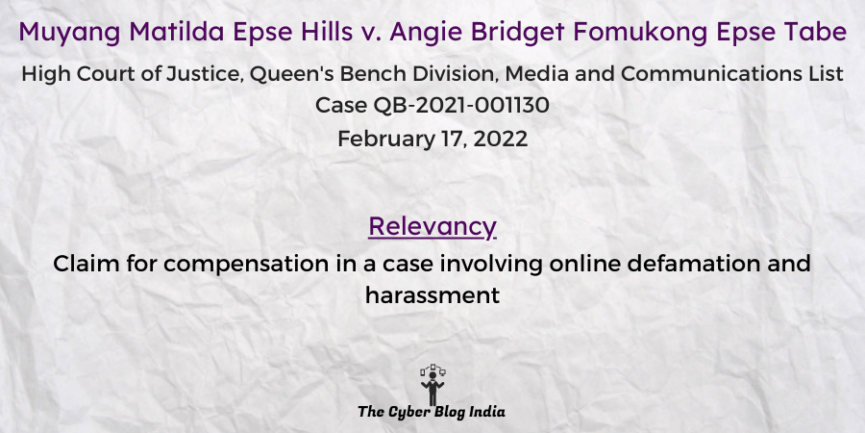Muyang Matilda Epse Hills v. Angie Bridget Fomukong Epse Tabe

Muyang Matilda Epse Hills v. Angie Bridget Fomukong Epse Tabe
[2022] EWHC 316 (QB)
In the High Court of Justice, Queen’s Bench Division, Media and Communications List
Case QB-2021-001130
Before Deputy Judge Richard Spearman
Decided on February 17, 2022
Relevancy of the Case: Claim for compensation in a case involving online defamation and harassment
Statutes and Provisions Involved
- The Civil Procedure Rules 1998 (Rule 17.1, 23.11, 39.3, 52.12)
- The Defamation Act 1996
- The Human Rights Act 1998 (Section 2, 3, 6, 12)
- The Protection from Harassment Act 1997 (Section 1, 2, 3, 7)
- The Defamation Act 2013 (Section 1)
Relevant Facts of the Case
- The parties were members of the Cameroonian community in the UK. The claimant was a nurse.
- The defendant operated several Facebook accounts and a YouTube channel with followers present in the UK and internationally.
- The claimant discovered that the defendant had posted unpleasant, insulting, and vulgar material about her online. Despite the claimant requesting her to stop, the defendant continued to abuse and intimidate her.
- On filing a case, the defendant did not file an acknowledgement of service or defence. The claimant won a default judgment.
- The claimant filed for an assessment of damages capped at £10,000 and an injunction restraining further publication of defamatory material. The defendant did not take part in the proceedings again.
Prominent Arguments by the Counsels
- The claimant’s counsel submitted that the defendant’s publications presented the claimant as a prostitute, a dirty and unclean woman, and guilty of criminal conduct. She has further continued to make such publications even after the initiation of formal proceedings.
Opinion of the Bench
- The defendant’s imputation was sufficiently grave and had the potential to cause serious harm. The defendant had published seriously defamatory comments.
- The defendant made the statements as facts, and many people were likely to have read them.
- Internet publications have destructive potential as it is permanent. The claimant has suffered anxiety, depression, and suicidal thoughts because of the defendant’s online harassment.
- The defendant was shameless, hostile, unforgiving, and considered herself above the law. Thus, it is a fit case for awarding the damages to the claimant.
Final Decision
- The court awarded the damages amounting to £10,000 and an injunction against the defendant. The court also awarded the defendant to pay the claimant’s cost of the claim.
Anjali Agrawal, an undergraduate student at the NALSAR University of Law, prepared this case summary during her internship with The Cyber Blog India in May/June 2022.
